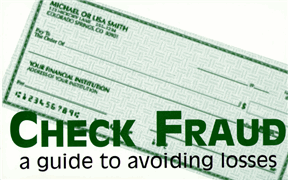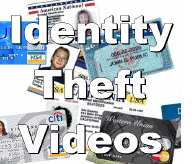121+ Identity Theft Resources
California Identity Theft Resources
Ohio Identity Theft Resources
Pennsylvania Identity Theft Resources
Texas Identity Theft Resources
Federal Government ID Theft Resources
 The federal government has produced, promoted, and distributed an extensive library of consumer education materials in print and electronic formats to help consumers learn about various aspects of identity theft. Listed below are titles and locations of each agency's identity theft consumer education materials.
The federal government has produced, promoted, and distributed an extensive library of consumer education materials in print and electronic formats to help consumers learn about various aspects of identity theft. Listed below are titles and locations of each agency's identity theft consumer education materials.
 The FTC has played a primary role in consumer awareness and education, developing information that has been co-branded by a variety of groups and agencies. Its website, http://www.ftc.gov/bcp/edu/microsites/idtheft/, serves as a comprehensive one-stop resource in both English and Spanish for consumers. (Spanish www.ftc.gov/bcp/edu/microsites/idtheft/en-espanol/index.html)
The FTC has played a primary role in consumer awareness and education, developing information that has been co-branded by a variety of groups and agencies. Its website, http://www.ftc.gov/bcp/edu/microsites/idtheft/, serves as a comprehensive one-stop resource in both English and Spanish for consumers. (Spanish www.ftc.gov/bcp/edu/microsites/idtheft/en-espanol/index.html)
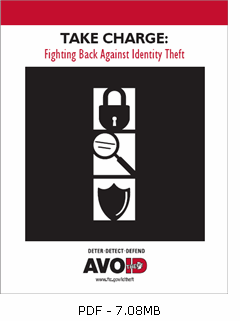 The FTC also recently implemented a national public awareness campaign centered around the themes of "Deter, Detect, and Defend." This campaign seeks to drive behavioral change in consumers that will reduce their risk of identity theft (Deter); encourage consumer monitoring of their credit reports and accounts to alert them of identity theft soon after it occurs (Detect); and mitigate the damage caused by identity theft should it occur (Defend). This campaign, mandated in the FACT Act, consists of material written for consumers about identity theft and material written for organizations, community leaders, and local law enforcement on how to communicate and educate their constituencies about identity theft.
The FTC also recently implemented a national public awareness campaign centered around the themes of "Deter, Detect, and Defend." This campaign seeks to drive behavioral change in consumers that will reduce their risk of identity theft (Deter); encourage consumer monitoring of their credit reports and accounts to alert them of identity theft soon after it occurs (Detect); and mitigate the damage caused by identity theft should it occur (Defend). This campaign, mandated in the FACT Act, consists of material written for consumers about identity theft and material written for organizations, community leaders, and local law enforcement on how to communicate and educate their constituencies about identity theft.
The Deter, Detect, and Defend materials have been adopted and distributed by hundreds of entities, both public and private, involved in the fight against identity theft. The National Council of Higher Education Loan Program, the Direct Marketing Association, the National Association of Realtors, the Internal Revenue Service (IRS), neighborhood associations, and over 500 local law enforcement agencies among others, are using the materials as part of their own consumer education efforts. The U.S. Department of Justice's Office for Victims of Crimes disseminated 4,600 Deter, Detect, Defend kits to the victim services field offices.
Other FTC publications include:
Fighting Back Against Identity Theft
www.ftc.gov/bcp/edu/pubs/consumer/idtheft/idt01.htmID Theft: What It's All About
http://www.ftc.gov/bcp/edu/pubs/consumer/idtheft/idt08.shtm
Take Charge: Fighting Back Against Identity Theft
www.ftc.gov/bcp/edu/pubs/consumer/idtheft/idt04.shtm"Active Duty" Alerts Help Protect Military Personnel from Identity Theft
http://www.ftc.gov/bcp/edu/pubs/consumer/alerts/alt147.shtmWhat To Do If Your Personal Information Has Been Compromised
www.ftc.gov/bcp/edu/microsites/idtheft/consumers/compromised.htmlRemedying the Effects of Identity Theft
www.ftc.gov/bcp/edu/pubs/consumer/idtheft/idt09.pdfYour Access to Free Credit Reports
www.ftc.gov/bcp/edu/pubs/consumer/credit/cre34.shtmHow Not to Get Hooked by a Phishing Scam
www.ftc.gov/bcp/edu/pubs/consumer/alerts/alt127.htm
In Spanish - www.ftc.gov/bcp/conline/spanish/alerts/s-phishingalrt.htmPrivacy Choices for Your Personal Financial Information
www.ftc.gov/bcp/edu/pubs/consumer/credit/cre29.shtmMedicare Part D Solicitations: Words to the Wise About Fraud
www.ftc.gov/bcp/edu/pubs/consumer/alerts/alt168.shtmID Theft Publications
www.ftc.gov/bcp/menus/consumer/data/idt.shtm
Bureau of Justice Assistance (BJA)
The Justice Department's BJA, together with the National Crime Prevention Council, created an identity theft booklet, Preventing Identity Theft: a Guide for Consumers,23 and produced radio and television public service announcements about identity theft, featuring McGruff the Crime Dog. Other publications include Identity Theft and Fraud at http://www.usdoj.gov/criminal/fraud/websites/idtheft.html.
The Department of Justice's OVC has several web pages on identity theft,24 and has provided funding to several identity theft-related initiatives, such as the Ohio Identity Theft Verification Passport program. Other publications include Identity Theft, at www.ojp.gov/ovc/help/it.htm.
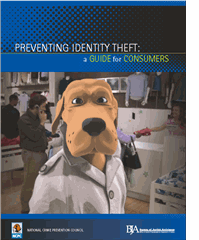 The Department of Justice's OJP also has developed some identity theft resources, including the following publications:
The Department of Justice's OJP also has developed some identity theft resources, including the following publications:
Justice Resource Update
www.ncjrs.gov/jru/spring_2006/featured.htmlPreventing Identity Theft: A Guide for Consumers
www.ncpc.org/cms/cms-upload/prevent/files/idtheftrev.pdf
The Executive Office for the United States Trustees, a component of DOJ, has developed the following publication on identity theft: Fraud/Identity Theft at www.usdoj.gov/ust/r16/fraud.htm.
Some United States Attorney's Offices also have their own identity theft web pages, for example: www.usdoj.gov/usao/gan/citizen/idtheft.html and http://www.usdoj.gov/usao/cac/HowCanWeHelp/idtheft/resource.html.
Over 120,000 copies of the Department of the Treasury's DVD about identity theft, Identity Theft: Outsmarting the Crooks, have been distributed to the public. See www.treasury.gov/press/releases/js3083.htm.
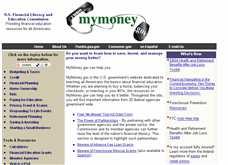 The FACT Act established the Financial Literacy and Education Commission (the Commission), and appointed the Secretary of the Treasury as head. The Commission, composed of 19 other federal agencies and bureaus, launched a website and toll-free hotline for financial literacy in 2004, www.MyMoney.gov and 1-888-MYMONEY, along with a free toolkit. These resources include consumer information (available in English and Spanish) about how to defend oneself against identity theft and what victims should do to set their records straight.
The FACT Act established the Financial Literacy and Education Commission (the Commission), and appointed the Secretary of the Treasury as head. The Commission, composed of 19 other federal agencies and bureaus, launched a website and toll-free hotline for financial literacy in 2004, www.MyMoney.gov and 1-888-MYMONEY, along with a free toolkit. These resources include consumer information (available in English and Spanish) about how to defend oneself against identity theft and what victims should do to set their records straight.
Separately, the Department of Treasury's Financial Management Service and the Federal Reserve Banks sponsor Go Direct, a campaign to motivate people who receive federal benefit checks to use direct deposit. Direct deposit is the best way for people to get their Social Security and SSI payments because it eliminates the risk of stolen checks, reduces fraud, and gives them more control over their money. A simple action like enrolling in direct deposit can offer much-needed peace of mind to people who rely on federal benefits, most of whom are seniors and people with disabilities.
The OCC has issued a number of publications on identity theft. Those include the following:
Fight Back: What You Can Do about Identity Theft
www.occ.gov/consumer/idtheft.htmHow to Avoid Becoming a Victim of Identity Theft
www.occ.treas.gov/idtheft.pdfInternet Pirates Are Trying to Steal Your Personal Financial Information
www.occ.gov/consumer/phishing.htmCheck Fraud: A Guide to Avoiding Losses
www.occ.treas.gov/chckfrd/chckfrd.pdf
The OTS has issued a number of publications related to identity theft. These publications deal with topics including pretext calling, phishing and email scams, and customer/consumer education, and can be found on the OTS website.
The IRS, another arm of the Treasury Department, has issued the following publication on identity theft:
Ten Things the IRS wants you to know about Identity Theft
www.irs.gov/newsroom/article/0,,id=202865,00.htmlPhishing Identity Theft and Scams
http://www.irs.gov/newsroom/article/0,,id=154848,00.htmlIdentity Theft Email Scams - A Growing Problem
www.irs.gov/newsroom/article/0,,id=177062,00.htmlSuspicious Emails and Identity Theft
www.irs.gov/newsroom/article/0,,id=155682,00.htmlIdentity Theft and Your Tax Records
www.irs.gov/individuals/article/0,,id=136324,00.html
TIGTA has issued the following publication for taxpayers relating to identity theft:
Computer Security Bulletin Phishing Scams
www.treas.gov/tigta/docs/phishing_alert_2006.pdf
The USSS, a component of DHS, is active in the investigation of identity theft. In that role, it also has issued the following guidance on identity theft:
Financial Crimes Division
www.treas.gov/usss/financial_crimes.shtmlFrequently Asked Questions (FAQ): Protecting Yourself
www.treas.gov/usss/faq.shtml#identity
The FDIC's December 2004 Identity Theft Study recommended the development of an educational initiative targeted to online banking customers on how to avoid common scams. That initiative, entitled Don't Be an On-Line Victim, is comprised of three parts: how consumers can secure their computer; how consumers can protect themselves from electronic scams that can lead to identity theft; and what consumers should do if they become the victim of identity theft. The educational tool is being distributed through the FDIC website and via CD-ROM. Additionally, in 2005, the FDIC sponsored four identity theft symposia entitled Fighting Back Against Phishing and Account-Hijacking. Each symposium included presentations by panels of experts from federal and state government, the banking industry, consumer organizations, and law enforcement. Total attendance at the symposia exceeded 575. The FDIC's 2006 symposia series, Building Consumer Confidence in an E-Commerce World, was a continuation of the FDIC's efforts to facilitate dialogue on the risks and solutions for e-commerce and payment system fraud. The FDIC is also working on an educational campaign, scheduled for rollout in 2007, to educate consumers about online banking and the protections available to them that make it safe.
The FDIC's other videos and publications on identity theft include the following:
Classic Cons... And How to Counter
Them www.fdic.gov/consumers/consumer/news/cnsprg98/cons.html
A Crook Has Drained Your Account. Who Pays?
www.fdic.gov/consumers/consumer/news/cnsprg98/crook.html
When a Criminal's Cover Is Your Identity
www.fdic.gov/consumers/privacy/criminalscover/index.html
Your Wallet: A Loser's Manual
www.fdic.gov/consumers/consumer/news/cnfall97/wallet.html
Identity Theft
www.fdic.gov/consumers/consumer/alerts/theft.html
The NCUA's primary publication on identity theft, entitled You Can Fight Identity Theft, can be found at www.ncua.gov/publications/brochures/identitytheft/phishbrochure-web.pdf.
The Federal Reserve Bank of Boston has published a consumer brochure entitled Identity Theft, which can be found at www.bos.frb.org/consumer/identity/idtheft.htm.
The SSA has a hotline for reporting fraud, which can be found at www.socialsecurity.gov/oig/guidelin.htm. In addition, the SSA's website, www.socialsecurity.gov/pubs/idtheft.htm, provides links to various resources to assist victims of identity theft. SSA has several printed publications (in English and Spanish) on safeguarding the use of SSNs and cards to help prevent identity theft. These include the following:
Identity Theft and Your Social Security Number (SSA Publication No. 05-10064)
www.socialsecurity.gov/pubs/10064.htmlYour Social Security Number and Card
(SSA Pub. No. 05-10002) www.socialsecurity.gov/pubs/10002.htmlNew Rules for Getting a Social Security Number and Card
(SSA Publication No. 05-10120) www.socialsecurity.gov/pubs/10120.htmlFrequently Asked Questions on SSA's Internet website
www.socialsecurity.govSSA OIG (Office of Inspector General): When Someone Else Uses Your Social Security Number Fact Sheet
www.socialsecurity.gov/oig/hotline/when.htmSSA OIG Identity Theft Links
www.socialsecurity.gov/oig/investigations/links.htmU.S. Postal Inspection Service (USPIS)www.usps.com
The USPIS has been active in engaging in outreach activities related to identity theft. For example, the USPIS, together with the FTC and the Better Business Bureau (BBB), developed the "Shred It & Forget It" campaign, which encourages consumers to shred discarded documents containing personal information. The USPIS also maintains an identity theft website and has conducted national campaigns about Internet fraud and identity theft, and produced two DVDs on these subjects -"Identity Crisis" and "Web of Deceit" - and Publication 248, "Safeguard Your Personal Information." Other publications include:
ID Theft Poster
www.usps.com/websites/depart/inspect/idposter.pdfIdentity Theft Is America's Fastest-Growing Crime
www.usps.com/websites/depart/inspect/idthft_ncpw.htmRead These Tips to Protect Yourself from Identity Theft
www.usps.com/websites/depart/inspect/idtheftips.htmSafeguard Your Personal Information
www.usps.com/cpim/ftp/pubs/pub280/welcome.htmIdentity Theft: Stealing Your Name and Your Money
www.usps.com/websites/depart/inspect/IDtheft2.htmLooksTooGoodToBeTrue.com
www.lookstoogoodtobetrue.com/fraud.aspxU.S. Department of Educationwww.ed.gov
The Department of Education offers materials aimed at increasing students' and college administrators' awareness of identity theft and steps to reducing students' chances of falling victim. The Department also has included identity theft prevention tips in the billing statements that are sent to student borrowers. Its Federal Student Aid website, www.federalstudentaid.ed.gov, contains information on safeguarding student aid information and reducing the risk of identity theft.25 The Department's OIG's website, www.ed.gov/misused, both offers and collects information on identity theft. The OIG also conducts presentations at conferences of financial aid professionals, and has developed a DVD, FSA Identity Theft-We Need Your Help, to alert the financial aid community to the problem.
Department of Health and Human Services (HHS)www.hhs.gov
HHS's Office of Disease Prevention and Health Promotion has circulated the following publication relating to identity theft: Healthfinder - Protecting Your Identity, which can be found at www.healthfinder.gov/docs/doc09195.htm.
Centers for Medicare and Medicaid Serviceswww.cms.gov
HHS's Centers for Medicare and Medicaid Services has released the following publications relating to identity theft:
Medicare and You 2009 pages 94-97
www.medicare.gov/publications/pubs/pdf/10050.pdfHolding Ourselves to a Higher Standard
www.cms.hhs.gov/InformationSecurity/The National Women's Health Information CenterProtecting Yourself from Cybercrime
www.girlshealth.gov/safety/internet/cybercrime.cfmFood and Drug Administrationwww.fda.gov
The FDA's publications relating to identity theft include the FDA Consumer magazine (July-August 2005 Issue), and Be Aware and Beware of Identity Theft, which can be found at www.fda.gov/fdac/departs/2005/405_fda.html#theft.
National Institutes of Health (NIH): National Institute on AgingThe NIH's National Institute on Aging provides guidance to the elderly on matters related to identity theft in a publication entitled Age Page Crime and Older People, which can be found at www.niapublications.org/agepages/PDFs/Crime_and_Older_People.pdf.
Administration on AgingHHS's Administration on Aging has supported the development of the following materials related to identity theft:
Protect Yourself from Identity Theft
www.consumerlaw.org/action_agenda/seniors_initiative/identity_theft.shtmlWhat You Should Know About Your Credit Report
www.consumerlaw.org/action_agenda/seniors_initiative/content/CFactsCreditReport.pdfProtecting Older Americans from Telemarketing Scams:A Quick Guide for Advocates
www.consumerlaw.org/initiatives/seniors_initiative/concerns_telemarket.shtmlWhat To Do If You've Become The Victim of Telemarketing Fraud
www.consumerlaw.org/initiatives/seniors_initiative/telemarketing_fraud.shtmlIn addition, the Administration on Aging's Senior Medicare Patrol (SMP) program utilizes the skills and expertise of volunteers that educate and empower beneficiaries to take an active role in the detection and prevention of health care fraud and abuse, with a focus on the Medicare and Medicaid programs. The National Consumer Protection Technical Resource Center (www.smpresource.org) provides further information on the SMP program and a variety of consumer protection materials.
SECURITIES AND EXCHANGE COMMISSION (SEC)www.sec.gov
The SEC's guidance to consumers on identity theft includes a publication entitled Online Brokerage Accounts:What You Can Do to Safeguard Your Money and Your Personal Information which can be found at www.sec.gov/investor/pubs/onlinebrokerage.htm.
Private Sector Identity Theft Education ResourcesThe private sector has produced, promoted, and distributed an extensive library of consumer education materials in print and electronic formats to help consumers learn about various aspects of identity theft. Listed below are titles and links to a sample of individual organizations' identity theft consumer education materials, presented by sector. Information Technology (IT) Material produced by the information technology industry, most often delivered through the Internet, focuses largely on secure and safe computing, urging consumers to install anti-spyware, anti-virus, and firewall software on their computers, and educating them about the harm that can result from phishing, malware, and spyware. The information generally warns consumers against responding to spam and divulging personal information in email or on unsecured websites, and provides tips on creating strong passwords. For example, the National Cyber Security Alliance maintains Stay Safe Online, a website with tips on safe computing for adults and children.26
In addition, much of the material is directed to warning consumers about the existence of phishing attacks and assisting consumers in spotting suspect emails and websites. Microsoft and Best Buy, along with several other private and public partners, sponsor the Get Net Safe Tour, in which experts visit schools, hold assemblies, parents nights, local community and senior events, and Internet fairs to discuss general Internet safety, including topics related to identity theft. Similarly, Americans for Technology Leadership, a coalition of technology professionals, consumers, and organizations, conducts Take Back The Net cybersecurity workshops, which include discussions of phishing and other identity theft-related topics, for consumers throughout the country.
AOL
Money & Finance - Identity Theft
money.aol.com/creditdebt/identity/Microsoft
Security at Home: Protect Yourself
www.microsoft.com/athome/security/privacy/default.mspxEarthlink
Earthlink Identity Protection Center
www.earthlink.net/mysecurity/identity/E-bay
Tutorial: Spoof (fake) E-mails http://pages.ebay.com/education/spooftutorial/Beware of Phishing
http://www.staysafeonline.org/content/phishingThe Anti-Phishing Working Group
www.antiphishing.org/Consumer Advice: What To Do If You've Given Out Your Personal Financial Information
www.antiphishing.org/consumer_recs2.htmlGetNetWise
www.getnetwise.orgThe Business Software Alliance / Cybersafety Phishing: Do you know if someone is trying to steal your identity?
www.bsacybersafety.com/Financial Institutions and Credit Providers Identity Theft ResourcesThe financial services sector provides a great deal of information about common frauds related to identity theft, such as phishing, pharming, spoofing, pretext calling, and dumpster diving. Many institutions and credit card service providers also offer their customers information about identity theft prevention and remediation through statement stuffers, mailers, and websites. The information often includes explanations of common terminology and definitions related to these frauds, as well as explanations about how they work. The Texas Bankers Association, for example, produces inserts, posters, and wallet cards about identity theft for distribution to customers by Texas banks.27 The Securities Industry Association publishes a booklet that informs investors of how to avoid identity theft and what to do if they are the victim of identity theft.28 Securities self-regulatory organizations (SROs), such as the NASD and the NYSE, also publish guidance relating to identity theft. For example, NASD has published "Phishing and Other Online Identity Theft Scams: Don't Take the Bait."29
MasterCard Identity Theft
www.mastercard.com/us/personal/en/securityandbasics/identitytheft/index.htmlBank of America Identity Theft and Your Rights
www.bankofamerica.com/privacy/Control.do?body=privacysecur_idprotectCapital One - Find Out How To Protect Yourself From Fraud And Identity Theft
www.capitalone.com/fraud/Chase Identity Theft
https://www.chase.com/digital/resources/privacy-security/questions/identity-theftCiti Protect Yourself
www.citicards.com/cards/wv/cm/be-protected/identity-theft/protect-yourself.htmlColumbia Credit Union Security and Identity Theft
www.columbiacu.org/identity/identity_tips.htmlCommerce Bank Identity Theft and Fraud
www.commercebank.com/about/privacy/identity.aspU.S. Bank Online Security
www.usbank.com/cgi_w/cfm/about/online_security/index.cfmVirginia Credit Union Security and Identity Theft
www.vacu.org/education/security.aspWells Fargo Identity Theft
www.wellsfargo.com/privacy_security/fraud/operate/idtheftWells Fargo Identity Fraud Safety Quiz
www.wellsfargo.com/privacy_security/fraud/protect/quiz/Visa USA Protect Yourself
www.usa.visa.com/personal/security/protect_yourself/index.htmlMedical Identity TheftThe health care industry also provides information specifically about "medical identity theft," which occurs when an unauthorized individual uses someone's personal information either to obtain medical treatment, prescription medications, or other medical goods or to make false claims for medical services. While this type of identity theft is detrimental to the victim's financial status, it also can result in the exhaustion of health insurance coverage and the addition of false entries to the victim's medical record, incorrect medical treatment, or even the loss of a job if employers require physical exams and medical history checks.30 Minneapolis-based health system Allina Hospitals and Clinics, targeted by an identity theft ring, produced a booklet to alert physicians and their staff on how to prevent patient identity theft, and to provide tips for medical professionals to protect themselves from becoming identity theft victims.Medical Identity Theft:the information crime that can kill you, Dixon, Pam. World Privacy Forum, Spring 2006.
www.worldprivacyforum.org/pdf/wpf_medicalidtheft2006.pdfWhat is Medical Identity Theft - FTC.gov
www.ftc.gov/bcp/edu/microsites/whocares/medicalidt.shtmCollege & University Identity Theft
For a variety of reasons, college students are frequent targets of identity thieves. Colleges and universities store vast amounts of personal information about students. According to one report, one-half to one-third of all reported personal information breaches in 2006 occurred at colleges and universities.31 The student lifestyle also may contribute to the high rate of identity theft in this age group. College students tend to keep personal information unguarded in shared dorm rooms. In recognition of the increased vulnerability of the college population, many universities are providing information to their students about the risks of identity theft through websites, orientation campaigns, and seminars. The University of Michigan undertook a wide-scale effort, launching Identity Web, a comprehensive site based on the recommendations of a graduate class in the fall of 2003.32 The State University of New York's Orange County Community College offers identity theft seminars, the result of a student who fell victim to a scam. A video at student orientation sessions at Drexel University in Philadelphia warns students of the dangers of identity theft on social networking sites. Bowling Green State University in Ohio emails campus-wide "fraud alerts" when it suspects that a scam is being targeted to its students. In recent years, more colleges and universities have hired chief privacy officers, focusing greater attention on the harms that can result from the misuse of students' information.
The higher education community, including associations and financial institutions, also has conducted outreach to financial aid counselors, students, parents, and borrowers. For instance, the National Council of Higher Education Loan Programs (NCHELP) reached out to its constituents and encouraged them to take advantage of identity theft resources produced by the FTC and share them with students. Many college bookstores now provide these educational materials to students purchasing textbooks. The following links provide examples of universities' educational information on identity theft.
Harvard University - Identity Theft Page
www.hupd.harvard.edu/id_theft.phpNorthwestern University - Secure Your Identity
www.it.northwestern.edu/security/protectingprivacy/index.htmlPennsylvania State University - Credit Cards, Privacy Matters and Identity Theft
consumerissues.cas.psu.edu/PDFs/CreditPrivacyIdentity.pdfTulane University - What to do if ID Theft Happens to You
www.tuhscpd.tulane.edu/Safety/idtheft.htmUniversity of California-LA Identity Theft Resources
www.identityalert.ucla.edu/resources.htmUniversity of Kansas - Protecting Your Identity
www.privacy.ku.edu/idtheft/University of Michigan - Protecting against Misrepresentation and Theft
identityweb.umich.edu/University of Minnesota - Safe Computing Identity Theft
safecomputing.umn.edu/safepractices/idtheft.htmlUniversity of Missouri-Kansas City - Identity Theft Tips
www.umkc.edu/adminfinance/police/tips/Identity.aspUniversity of Oklahoma - ID Theft NoteBook
www.ou.edu/oupd/idtheft.htmUniversity of Utah - Identity Theft Page
www.it.utah.edu/leadership/security/identity.htmlYale University - Secure Computing
www.yale.edu/its/secure-computing/privacy/identity-theft.htmlReferencesThe President's Identity Theft Task Force, Combating Identity Theft, Volume II: Supplemental Information

